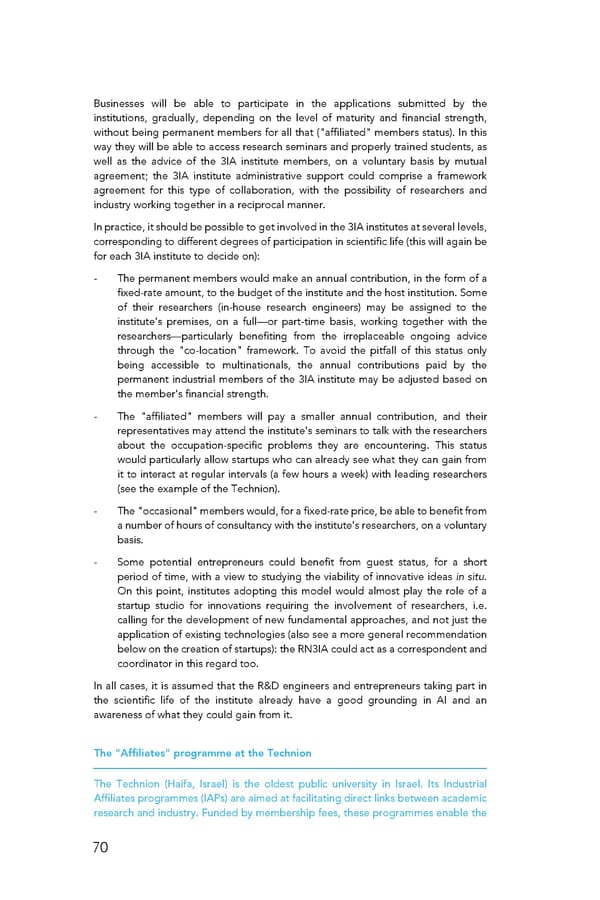Businesses will be able to participate in the applications submitted by the institutions, gradually, depending on the level of maturity and financial strength, without being permanent members for all that ("affiliated" members status). In this way they will be able to access research seminars and properly trained students, as well as the advice of the 3IA institute members, on a voluntary basis by mutual agreement; the 3IA institute administrative support could comprise a framework agreement for this type of collaboration, with the possibility of researchers and industry working together in a reciprocal manner. In practice, it should be possible to get involved in the 3IA institutes at several levels, corresponding to different degrees of participation in scientific life (this will again be for each 3IA institute to decide on): - The permanent members would make an annual contribution, in the form of a fixed-rate amount, to the budget of the institute and the host institution. Some of their researchers (in-house research engineers) may be assigned to the institute's premises, on a full—or part-time basis, working together with the researchers—particularly benefiting from the irreplaceable ongoing advice through the "co-location" framework. To avoid the pitfall of this status only being accessible to multinationals, the annual contributions paid by the permanent industrial members of the 3IA institute may be adjusted based on the member's financial strength. - The "affiliated" members will pay a smaller annual contribution, and their representatives may attend the institute's seminars to talk with the researchers about the occupation-specific problems they are encountering. This status would particularly allow startups who can already see what they can gain from it to interact at regular intervals (a few hours a week) with leading researchers (see the example of the Technion). - The "occasional" members would, for a fixed-rate price, be able to benefit from a number of hours of consultancy with the institute's researchers, on a voluntary basis. - Some potential entrepreneurs could benefit from guest status, for a short period of time, with a view to studying the viability of innovative ideas in situ. On this point, institutes adopting this model would almost play the role of a startup studio for innovations requiring the involvement of researchers, i.e. calling for the development of new fundamental approaches, and not just the application of existing technologies (also see a more general recommendation below on the creation of startups): the RN3IA could act as a correspondent and coordinator in this regard too. In all cases, it is assumed that the R&D engineers and entrepreneurs taking part in the scientific life of the institute already have a good grounding in AI and an awareness of what they could gain from it. The "Affiliates" programme at the Technion The Technion (Haifa, Israel) is the oldest public university in Israel. Its Industrial Affiliates programmes (IAPs) are aimed at facilitating direct links between academic research and industry. Funded by membership fees, these programmes enable the 70
 For a Meaningful AI - Report Page 70 Page 72
For a Meaningful AI - Report Page 70 Page 72